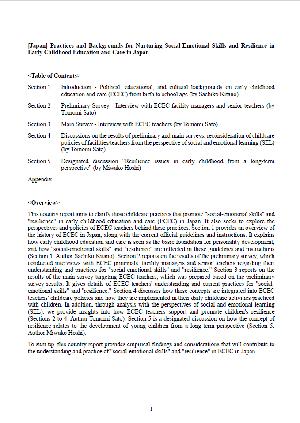 |
Overview
This country report aims to clarify those childcare practices that promote "social-emotional skills" and "resilience" in early childhood education and care (ECEC) in Japan. It also seeks to explore the perspectives and policies of ECEC teachers behind these practices. Section 1 provides an overview of the history of ECEC in Japan, along with the current official guidelines and instructions. It explains how early childhood education and care is seen as the basic foundation for personality development, and how "social-emotional skills" and "resilience" are reflected in these guidelines and instructions (Section 1: Author Sachiko Kitano). Section 2 reports on the results of the preliminary survey, which conducted interviews with ECEC principals, facility managers and senior teachers regarding their understanding and practices for "social-emotional skills" and "resilience." Section 3 reports on the results of the main survey targeting ECEC teachers, which was prepared based on the preliminary survey results. It gives details of ECEC teachers' understanding and current practices for "social-emotional skills" and "resilience." Section 4 discusses how these concepts are integrated into ECEC teachers' childcare policies and how they are implemented in their daily childcare activities practiced with children. In addition, through analysis with the perspectives of social and emotional learning (SEL), we provide insights into how ECEC teachers support and promote children's resilience (Sections 2 to 4: Author Tomomi Sato). Section 5 is a designated discussion on how the concept of resilience relates to the development of young children from a long-term perspective (Section 5: Author Miwako Hoshi).
To sum up, this country report provides empirical findings and considerations that will contribute to the understanding and practice of "social-emotional skills" and "resilience" in ECEC in Japan.
Read full report



 Tomomi Sato
Tomomi Sato Sachiko Kitano
Sachiko Kitano Miwako Hoshi
Miwako Hoshi










